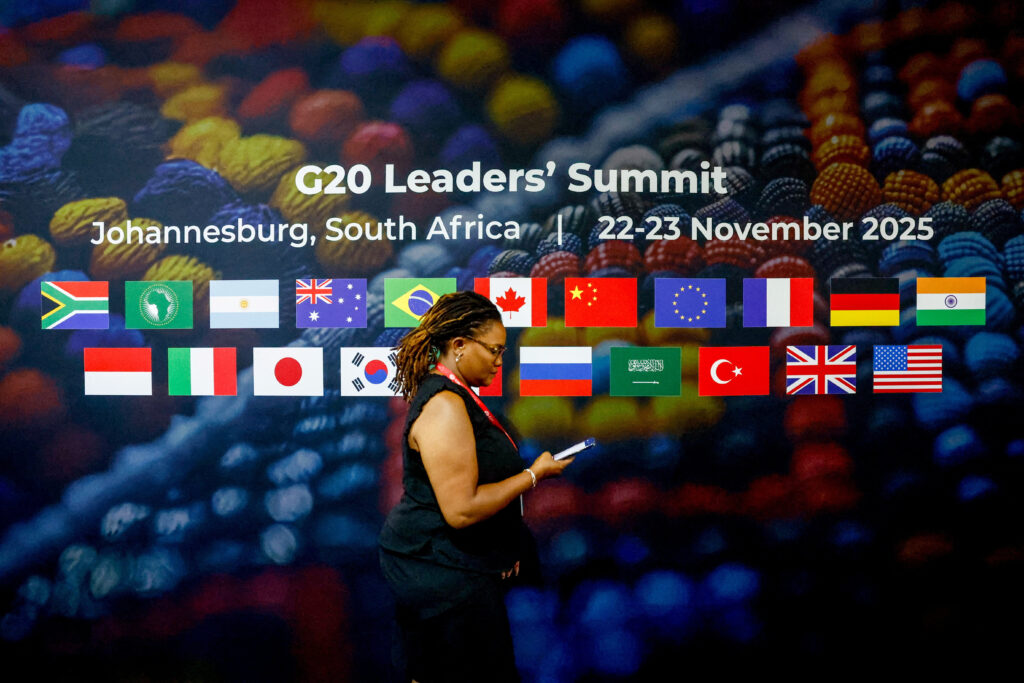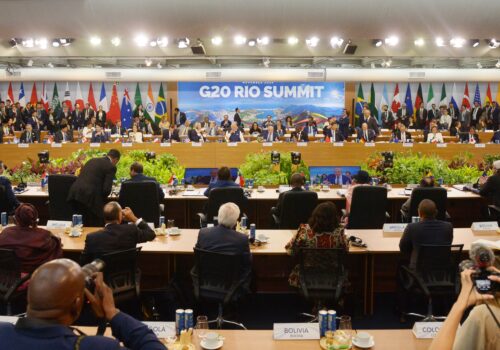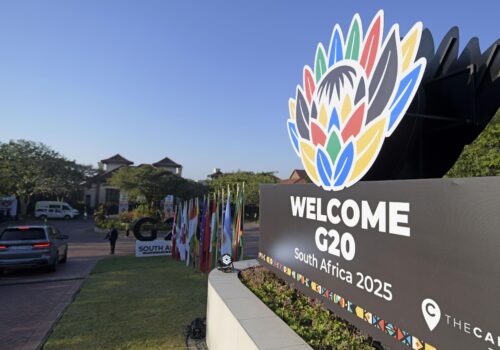JOHANNESBURG—This wasn’t South Africa’s first “T20.” The country has staged some of cricket’s most dramatic Twenty20 (abbreviated as T20) matches—packed stadiums, high stakes, and global attention on Johannesburg, Cape Town, and Durban. In the opening session of the November 13–14 meetings, Alvin Botes, South Africa’s deputy minister of international relations and cooperation, nodded to that sporting record but noted that this T20 belonged to think tanks instead of to cricket. This one focused not on bowlers and wickets but on the future of global economic governance.
Two weeks ago, I was in Johannesburg for South Africa’s Think20 (T20) Summit, the policy engagement group that informs the Group of Twenty (G20) leaders. The meeting came at a critical moment: the final year in a four-year cycle of Global South G20 presidencies. What I heard was a clearer, more assertive articulation of expectations—alongside pointed frustrations.
That assertiveness played out days later at the G20 Summit itself. South Africa secured adoption of the 122-point Leaders’ Declaration at the outset of the meeting, an uncommon step in G20 practice. The declaration proceeded without US endorsement but with broad support from other members. For the first G20 held in Africa, the early adoption was significant. It reflected an emerging-market cohort more willing to manage processes and shape outcomes on its own terms.
Here is what I heard on the ground in Johannesburg:
US economic leadership remains unpredictable but indispensable
Throughout the week, I heard consistent concern about the stability and rules of the global economic order. Participants described US policy tools—from tariffs and export controls to financial sanctions—as being deployed more frequently, with shorter notice and fewer clear guardrails, creating spillovers that materially affect emerging-market stability. The T20 communiqué’s emphasis on reducing reliance on a single dominant currency, for example, reflects some of these concerns.
And yet, no one argued that the system can function without the United States. The Johannesburg declaration’s focus on adaptation finance, debt sustainability, and critical minerals still leans heavily on institutions where US support is essential. The goal is not to abandon the existing system, but to diversify risk within it and push for more transparent, rules-based, and reliable engagement from Washington.
AI as the new fault line
Sessions on artificial intelligence (AI) and the digital economy revealed a different but related imbalance. There was a shared recognition that the global AI ecosystem is highly concentrated: compute capacity, high-quality datasets, and advanced model development sit in a handful of countries and firms.
For emerging markets, this raises two concerns. First, dependence on foreign technology and infrastructure. Second, governance frameworks that were largely designed elsewhere and may not reflect their development priorities. Speakers argued that current global AI frameworks reflect advanced-economy risk profiles and regulatory debates, not the realities of countries still building basic digital infrastructure. Several participants called for open-source models, stronger regional collaboration, and domestic data-governance frameworks that better protect their interests.
AI is no longer a niche technical issue in these conversations. It is now firmly part of debates on industrialization, labor markets, and sovereignty.
A more coordinated Global South posture
The current presidency cycle has widened the G20 agenda to include development-finance reform, climate adaptation, and inclusive growth—areas emerging markets have long prioritized. Speakers emphasized that they are not simply responding to external pressures but setting agendas and building coalitions.
Africa is no longer framed as peripheral to global affairs. European participants described the continent as essential to the energy transition and supply-chain diversification. For both the United States and China, Africa has become a central arena of strategic competition. Participants argued that this attention can be turned into leverage, particularly as Africa is the center of critical-minerals supply chains.
Infrastructure and connectivity offered one of the clearest tests of this shift. Participants consistently argued that Africa needs better transport, energy, and digital links, but there was far less agreement on who should build them and on what terms. Frustration persists that many Western-backed corridors still primarily facilitate extraction and export of raw materials rather than supporting domestic industrial capacity. As one participant noted, Africa is “more connected to the global economy than to itself.” The core question was not how to supply more minerals to global markets, but how to capture more value within their own borders.
That leverage was visible in Johannesburg. The G20 Leaders’ Declaration and the new critical-minerals framework both emphasize “resilient” and “stable” critical-minerals value chains—reflecting the priorities of import-dependent economies. African officials, by contrast, used their position in those value chains to push for value addition at source and for corridors that knit together African markets under the African Continental Free Trade Area. Whether that leverage translates into concrete outcomes depends on a G20 system that is already overextended.
The leaders’ declaration also exposed a structural problem. While the G20 agenda keeps expanding, the willingness to deliver on commitments appears to be shrinking. The forum’s scope has evolved—infrastructure and critical minerals are now core macroeconomic issues, but they sit alongside debt, trade, and financial regulation on an increasingly crowded agenda, all competing for limited political capital and delivery capacity. That the declaration was adopted at all, and at the outset of the summit, sets an important precedent as the presidency rotates again in 2026. But it also raises a harder question: Can the G20 meaningfully tackle an ever-expanding list of priorities, or will it be forced to pivot to a more focused agenda?
Next up is the United States
The upcoming rotation presents an unusual opening. In its G20 presidency in 2026, the United States could lead on issues such as debt transparency, financial innovation, and energy security—areas where US interests align with broader G20 concerns about productivity and structural reform.
What stood out in Johannesburg is that, despite deepening geopolitical divisions, G20 members still face common economic challenges. Rising debt burdens, energy-security pressures, technological disruption, and climate adaptation affect all members, even as they diverge on solutions. That reality gives every major power a stake in keeping the G20 as a venue where these debates continue. Whether the G20 can maintain its relevance will depend on how those powers respond to emerging-market expectations and on whether they can still identify practical areas of coordination even as broader consensus frays.
Alisha Chhangani is an assistant director at the Atlantic Council’s GeoEconomics Center.
Note: The author’s visit to Johannesburg was sponsored by the South African T20 secretariat.
Further reading
Wed, Mar 5, 2025
Has the G20 become the G19?
Econographics By Hung Tran
The US has chosen to boycott the kick-off of South Africa's G20 presidency. But a G20 without the United States or its constructive engagement will be much weaker.
Thu, Oct 16, 2025
African voices are shaping G20 discussions around international financial architecture reform
AfricaSource By
Africa is not merely affected by these reforms. It is actively shaping them.
Thu, Nov 20, 2025
Dispatch from COP30: In the Brazilian jungle, the private sector takes center stage
New Atlanticist By Jorge Gastelumendi
Throughout COP30, there has been a recognition that the public and private sectors cannot act alone when it comes to climate finance.
Image: A woman walks inside the secured area of the G20 Summit venue at the Nasrec Expo centre, ahead of the summit scheduled for November 22–23, in Johannesburg, South Africa, November 21, 2025. REUTERS/Thomas Mukoya




